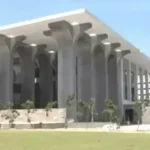ISLAMABAD: PTI president Gohar Ali Khan’s lawyer on Tuesday questioned the composition of the five-judge bench of the Federal Constitutional Court (FCC), arguing that it could not review an order issued earlier by a larger bench of the Supreme Court.
In his case, a larger court should hear the matter as the earlier decision was given by a seven-judge SC bench, lawyer Sameer Khosa argued before the FCC court.
The bench, headed by Justice Aamer Farooq and comprising Justice Ali Baqar Najafi, Justice Muhammad Karim Khan Agha, Justice Rozi Khan Barrech and Justice Arshad Hussain Shah, had accepted an intra-judicial appeal (ICA) seeking a declaration that the ordinance amending the Supreme Court (Practice and Procedure) Act, 2023 was ultra vires the Constitution.
Soon after the promulgation of the ordinance on September 20 last year, former Chief Justice of Pakistan (CJP) Qazi Faez Isa altered the composition of the three-judge committee provided for in the law by replacing Justice Munib Akhtar with Justice Aminuddin Khan, now the FCC Chief Justice.
The committee submitted its application to the Supreme Court under the now omitted Article 184(3) of the Constitution. One of the petitioners, Gohar Ali Khan, argued that giving the CJP discretion to nominate any judge to the committee effectively ensured a majority aligned with the CJP.
He described the ordinance as a direct attack on judicial independence and an attempt by the executive to influence the resolution of cases in the Supreme Court. He also said the ordinance violated Article 89 of the Constitution, adding that its timing, motivation and manner of issuance were questionable.
On Tuesday, after the hearing, Justice Aamer Farooq passed an order issuing notices to the respondents, mainly the President and the Ministry of Justice, stating that the petitioner had the right to appeal. He said the objections raised by the lawyer would be considered when the main argument was heard.
Judge Farooq added that the issue was likely to recur because Supreme Court rules, which the FCC had adopted by now, state that an appeal must be heard by a larger court. “We will interpret the points raised by counsel as the matter may arise again.”
During the hearing, Judge Ali Baqar Najafi asked if there is any express prohibition requiring that only a court larger than the one that issued a previous decision be able to hear an appeal against him.
When asked for help, Additional Solicitor General Chaudhry Aamir Rehman said that Section 189 suggests that the FCC is now the apex court and under Section 175E, all pending SC cases have been transferred to the FCC. Therefore, it is up to the FCC to determine its procedure and how to settle and hear cases.
He also cited cases in which a three-judge Supreme Court bench heard appeals against decisions by seven-judge High Court benches. But Sameer Khosa argued that Section 5 of the South Carolina Procedures and Practices Act required a larger court.
Given this, Judge Agha said that Section 5 was no longer in force and that the FCC would regulate the strength of the courts.
Justice Farooq observed that a smaller bench could deal with a matter and issue notices, but if a decision was overturned, a larger bench would be needed.
Separately, in a case concerning the appointment of sitting judges of the LHC as electoral tribunals under section 149 of the Electoral Act, 2017, Sameer Khosa said he had advised his clients, including Salman Akram Raja, to consider hiring other lawyers because he had reservations about the independence of the FCC. He sought time for them to decide how to proceed.
Published in Dawn, November 26, 2025








